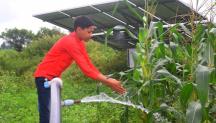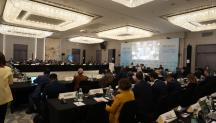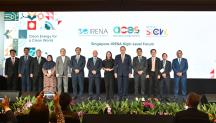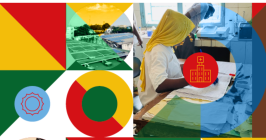
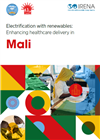
-
-
IRENA and SELCO Foundation (2025), Electrification with renewables: Enhancing healthcare delivery in Mali, International Renewable Energy Agency, Abu Dhabi.
Copied
https://www.irena.org/-/media/Files/IRENA/Agency/Publication/2025/Aug/IRENA_PAR_Electrification_RE_Healthcare_Mali_2025.pdf
Copied
Electrification with renewables: Enhancing healthcare delivery in Mali
Newsletter
Lack of reliable energy access in many parts of the world remains a major obstacle to healthcare delivery, with nearly one billion people relying on health facilities with no or unreliable electricity. This challenge is especially acute in sub-Saharan Africa, where only 28% of healthcare facilities have access to reliable electricity, critically undermining delivery of essential services like emergency care, maternity and neonatal care, and vaccine management. In Mali, the situation reflects this trend, with many health facilities, particularly in rural and remote areas, experiencing unreliable electricity access and inadequate health infrastructures. In 2024, 75% of health facilities have reliable electricity access, 20% have unreliable supply, and 4% do not have access to electricity.
This report assesses the opportunities for integrating decentralised renewable energy (DRE) solutions to power key health facilities, such as community health posts, district referral health centres and regional hospitals, which form the bedrock of Mali’s public health system, delivering primary and secondary level care. This report examines the energy needs of the different categories of health facilities, and proposes tailored technical solutions, with an estimate of the associated investment costs required for the deployment of these solutions across the country.
The report highlights a significant need for renewable energy solutions within the health sector, particularly in rural and underserved areas that currently rely predominantly on a mix of unreliable and expensive electricity sources. The report proposes the deployment of tailored solar PV+battery systems to support the country's efforts to reduce its carbon footprint and improve healthcare delivery, in alignment with Mali's Nationally Determined Contributions under the Paris Agreement, its Strategic Framework for Economic Recovery and Sustainable Development, and the Sustainable Development Goals (SDGs). The assessment emphasises the need for capacity building, financing models, and innovative operation and maintenance models to ensure long-term sustainability. Strengthening business models for energy service providers to incorporate other income-generating service offerings, improving access to finance, defining and enforcing quality standards for DRE equipment, and empowering local DRE supply chain actors will be essential to the successful integration of decentralised renewable energy solutions into Mali’s health sector.
